The rarest animals in the world in 2025 are fascinating animals that many do not have the opportunity to see. Sadly, the population of these animals decreases drastically because people are hunting on them, their own low breeding ability and many factors you will get to know in this article.
The population sizes mentioned below are the rough estimate numbers. These animals are the most endangered animals around the world, no matter if they are subspecies or not, they are an important part of the ecosystem, not having them would be a great loss to the world. They are on the brink of extinction.
However, it is never easy to save an endangered species from extinction. It usually requires a long-term devotion from committed scientists, managers, and supporters, which might equal decades of hard work.
Whatever our abilities are, we can also assist in the preservation of the species, with that we are also helping in the preservation of the ecosystem for which these animals exist.
Presently, here are the world’s rarest animals 2025 (most endangered animals), they are,
- Vaquita
- The Pangolin
- White Lion
- Red wolf
- Sumatran Rhinoceros
- Gobi bears
- Addax
- Saola
- Amur Leopard
- Philippines crocodiles
- Black-spotted Cuscus
- Northern Hairy-nosed Wombat
- Seneca White Deer
- Hirola
- The Hooded Grebe
Check them out, where you can find them (that is their habitat), population, threat, and lots more. Keep reading!
1. Vaquita
 |
| Image credit: Greenpeace.org |
Population size: 8
Threat: illegal fishing
Status on IUCN red list: Critically Endangered
Habitat: In Mexico's upper Gulf of California shallow water.
Life expectancy: 21 years
This animal is the smallest cetacean and the smallest porpoise as well. They are beautiful animals with a round head with strong bodies. From 1997, the number of Vaquita has been gradually reducing from 567 to 245 of the animal in 2008. Every year, 25 to 30 vaquitas are caught in gillnets and drown.
It was in 2019, between the months of June and December that the number drastically reduced due to illegal fishing with gillnets (A gillnet is a huge flat fishing net that is suspended vertically in the water and entangle) fish.
And today, the number of these animals remaining might be just 7 or 8 according to IUCN. Vaquitas are frequently trapped in nets intended to catch other creatures. Another reason this animal is among the rarest animals in the world in 2025 is that they live in a small area where the Colorado River empties into the Gulf.
Vaquita is a small animal that can be about 4.7 feet (144 cm) in length. Their average weight is around 102.3 Ibs (46.5 kg). These animals feed on crustaceans, squids, and benthic fishes. Sadly, the probability that this animal might extinct in two years’ time is very high.
2. The Pangolin
 |
| Image credit: Liberianobserver.com |
Population size: 8
Threat: Illegal trade
Status on IUCN red list: Critically endangered
Habitat: Asia and Africa
Life expectancy: 20 years
They are nocturnal solitary animals that live on the ground and can likewise climb trees. The timid, innocent pangolin has become much more well-known for only one thing: it is said to be the top trafficked non-human animal on the planet.
Undoubtedly, it is among the rarest animals in the world in 2025. Annually, hundreds of thousands of pangolins are hunted for their scales, which are used in traditional Chinese medicine, and their flesh, which is a delicacy for the ultra-rich in Vietnam and China.
For decades, traffickers and traders mostly targeted Asian species. Poachers are progressively resorting to African pangolins nowadays that the animal populations were diminished.
In Early 2019, all from Nigeria, Singapore captured a 14.2-ton container and a 14-ton cargo of pangolin scales—from an estimated 72,000 pangolins—in two record-breaking captures in the period of 7 days.
However, the pangolin scale has no nutritional value; it is just what people believe it is. Keratin is a substance made up of its scale just like hair, horn, and human fingernails, it has no medicinal value that people yearn to have, and this is what these animals are being killed for bringing them on the list .
3. White Lion
 |
| Image credit: Wilfred Klein / Wikimedia Commons |
Population size: Less than 13
Threat: Hunting
Status on IUCN red list: Vulnerable
Habitat: Desert regions, woodlands, and savannas in South Africa.
Life expectancy: 18 years
Their white coloration is caused by a rare recessive trait that results in a lighter pigmentation (leucism). These lions are not albinos, as their eyes can be gold or blue. But albino’s eyes and nose are red or pink.
They are like other lions under the classification of Panthera leo. Since they are under this classification, they are not listed as critically endangered, but vulnerable.
 |
| Image credit: Prem Gangar / Unsplash |
Due to their majestic appearance, in South Africa, they are sacred. Even though they are considered to be sacred, locals still hunt on them to the point that they go extinct. In 2004, the lions were reintroduced to the wild.
The Central Kruger Park in South Africa, the area is currently protected to preserve them. In 2006, a lion cub was born in the Timbavati area, and then in 2014, there was a birth of white lion cubs at the Kruger Park. This is how we have less than 13 of these white lions, as they are one out of the rarest animals.
4. Red wolf
 |
| Image credit: LaggedOnUser / Wikimedia Commons |
Population size: 17-20
Threat: Loss of habitat, car collisions, gunshot, and their own low breeding ability
Status on IUCN red list: Critically endangered
Habitat: Eastern North Carolina, USA
Life expectancy: 6-7 Years
They are rare wolves that you may not have the chance to see. In 1980, these red wolves have been thought to have been extinct. Since 17 pure breeds of the wolves were captured with the aim of reestablishing the red wolves and 7 years later, it was the wolves that were released back to the wild.
Then the population grows to 130, but unfortunately, the number has been decreasing gradually due to loss of habitat, car collisions, and even gunshots. Also, their breeding itself is very low; they only mate once per year, they do not give birth to many babies that can keep their population easily.
This factor also contributes to their being among the most endangered animals. They are lesser in size compared to other wolves, on average; their weight is between 15 and 81 pounds. These animals are mild; there is no record that shows they attack people.
They are carnivorous and they feed on other small animals such as rabbits and raccoons. They have one mate for life and are known for being caring parents, and they will even care for other wolf’s babies. And this gentle animal is a rare one.
See also:
5. Sumatran Rhinoceros
 |
| Image credit: 26 Isabella / Wikimedia |
Population size: Around 30
Threat: Poaching
Status on IUCN red list: Critically Endangered
Habitat: Tropical and subtropical woods, including highland and lowland in Southeast Asia.
Life expectancy: 30-45 Years
The Sumatran rhinoceros is the smallest remaining rhinoceros and the only Asian rhinoceros having 2 horns. Because of the long coarse hair that covers much of its body; it is best recognized for its shaggy look. For the reason that its fur falls away as it gets older, its age may be predicted to some extent by how hairy it is.
The rhino's hide has a crimson hue, giving it a distinct look. Sumatran rhinos are the most endangered rhinoceros species, as well as the Javan rhino. Although Sumatran rhinos are still more numerous than Javan rhinos, they are more vulnerable to poaching.
In 2015, the natural population of these animals was severely depleted within Malaysia. They are certainly part of the rarest animals in the world in 2025. The Sumatran rhinoceros is a lonely creature. Both males and females have habitat types that intersect.
Females have a smaller territory than males. When rhinos eventually meet, since they are solitary animals, they don't stay with each other for long.
These mammals are well-known for their trail-marking habit, leaving urine, dung, and soil scraps as olfactory and visual messages for oncoming rhinos.
These creatures are boundless walkers. They feed before sunrise and before dusk, and they move largely at night. During the day, they can be seen in rainwater ponds or wallows carved out along streams.
6. The Gobi Bears
 |
| Image credit: Fandom.com |
Population size: 40
Threat: Habitat loss, limited availability of food and water
Status on IUCN red list: Critically endangered
Habitat: Gobi Desert (southern Mongolia and northwestern China)
Life expectancy: 20-25 years
This brown bear is unique in that it is the only bear that is naturally adapted to desert life. They can weigh between 50 to 120 kg with lengths ranging from 1.5 to 1.7meters. As regards the ice-dwelling bears, their lives are threatened as well. Due to the illegal mining of gold, these bears' lives are being threatened.
For this, these animals sometimes have to walk for 20 to 30 miles to have a drink, sometimes they do not make it, they die on their way. These bears are very rare that in 2012, there were only 22, and then in 2014, they increase to just 29 bears.
In fact, 2013 was declared as “the year of protecting Gobi bears” by ministers in Ulaanbaatar. But in 2020, the bears increase slowly to 40 with the help of the government in organizing food dumps before winter’s hibernation.
There is the possibility that this animal population will increase slowly by the next 2 to 3 years, it might not be at the risk of extinction. But now they are still among the rarest animals in the world as their life is still endangered.
7. Addax
 |
| Image credit: Charles James Sharp |
Population size: about 3 (in the wild) & 2,000 (in ranches and zoos across the world)
Threat: Illegal over-exploitation and persecution
Status on IUCN red list: Critically Endangered
Habitat: Part of the Sahara Desert across northern Africa
Life expectancy: 19 t0 25 years
It is beautiful white dessert antelope species that in the past was largely found in Sahara. The sole remaining population is in Niger's Termit & Tin Toumma National Nature Reserve. They are listed among the rarest animals in the world in 2025 today with their small population in the wild.
In 2007, there are about 300 of these animals in the wild but suddenly drops due to habitat loss and exploration. Although it is illegal to kill or remove live addaxes in Niger, the species have been subjected to "huge disruption" by oil facilities run by the China National Petroleum Corporation, according to the IUCN team.
From the population in the wild, they are very close to extinction. However, the number of animals in zoos and ranches across the world can help in reintroducing them to the wild. Females are smaller than males, usually between 10 to 20% smaller.
On average, the male weighs between 100 to 135 kg (220-300 Ibs). This antelope has long spiral horns that are usually 76-109 cm (30-43 inches) in length. The female gives birth to a single baby once a year after the gestation period between 257 to 264 days. Their low breeding also makes them among the most endangered animals. Like other antelopes, they feed on vegetables.
8. Saola
 |
| Image credit: © David Hulse / WWF Canon |
Population size: Between 100 to 750; less than 100 are found in a conserved region.
Threat: Hunting and habitat loss
Status on IUCN red list: Critically endangered
Habitat: The Annamite mountain range, which runs between Vietnam and Laos, that is covered with forests.
Life expectancy: 10–15 years
They are also known as the Vu Quang bovid or the Asian unicorn. Both males and females have horns that can be 20 inches in length. Its fur is smooth and dark brown, with speckled white patches on the face. Although it looks like an antelope, DNA tests have revealed that it is more closely linked to cows.
They can be as tall as 35 inches when they stand with a length of 35 inches. On average, their weight can be 176 to 220 pounds. They are one of the rarest animals in the world. The exact number that remains is uncertain.
Nonetheless, because of its rarity, uniqueness, and fragility, it is among the region's top conservation concerns. The present number is estimated to be very few hundred at most, and probably as low as a few dozen at the most. Snares set in the forest for muntjac deer, sambar, or wild boar, frequently catch Saola.
The desire for traditional medicine in China, as well as foodservice markets in Laos and Vietnam, has led to a tremendous surge in lowland hunting and killing to serve the illicit wildlife trade.
They solely depend on forests to survive. Saola is being forced inside smaller places as forests fade underneath the chainsaw to make room for infrastructure, plantations, and agriculture.
The WWF is now using hidden cameras to watch saola in the eastern Xe Sap NPA in Laos, as well as throughout the borderline in Vietnam.
As support of the WWF's CarBi initiative, about 50,000 snares were cleared from vital saola habitat. This is a huge win for the mammal, as it requires a secure, snare-free environment to survive.
See also:
9. Amur Leopard
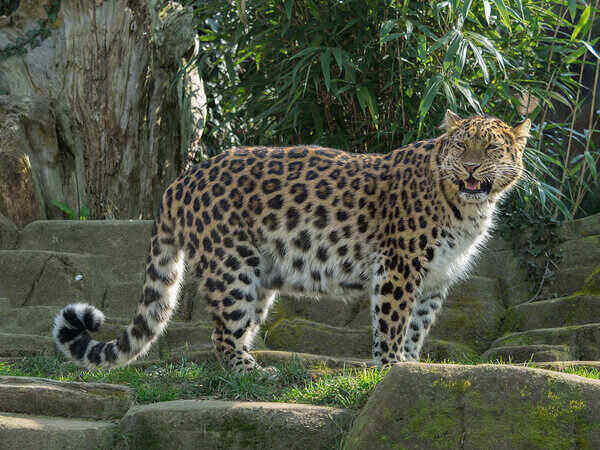 |
| Image credit: William Warby / Wikimedia Commons |
Population size: around 100
Threat: Illegal wildlife trade and Habitat loss
Status on IUCN red list: Critically endangered
Habitat: Amur-Heilong forests (regions of the Far East of Russia and North-Eastern China).
Life expectancy: 10-20 years
It is a beautiful solitary nocturnal animal, unknown to many people. They are unique animals whose spot patterns can serve as fingerprints, just like human fingerprints identify us individually. They are well adaptable and during the winter, their coats can grow to 7cm from 2.5 cm in the summer.
Their sizes range from 42 to 54 inches in length and they can be 25 to 31 inches tall. Females are less in weight between 55 to 75 pounds and males between 70 to 110 pounds. Few of these animals are in Russia while most are in China. They sidestep open grassland and favor developed forests.
They are one out of the rarest animals in the the world at have been hunted for years. Industrial development, farming, road building, and forest fires all contributed to the reduction of its population.
They have been listed as critically endangered since 1996. From 2019 to 2020 there were about 50 to 70 in the wild, but in 2021 there are around 90 adults.
But it is good to know that conservation endeavors are working, even though they are one of the most endangered animals, they are gradually driven back from the brink of extinction.
10. Philippines crocodiles
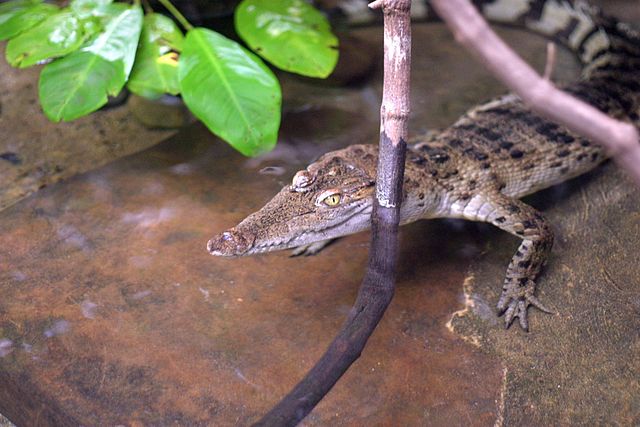 |
| Image credit: Scott Sandars from Melbourne, Australia |
Population size: around 100
Threat: Habitat loss and hunting
Status on IUCN red list: Critically Endangered
Habitat: South-western Mindanao and Northern Luzon Islands, Philippines.
Life expectancy: 70 to 80 years
It is a heavily armored crocodile that is brown with black spots. It is small among crocodile families that can be 3 meters (10 feet) long. It is a mild crocodile that shy’s away from contact with people; it is not aggressive like other larger species in the Philippines.
It is only crocodiles with the unusual ability to climb steep hills as high as 52 feet (16 meters), and scientists are still researching more on how they do this. Previously, these crocodiles is widely seen throughout the Philippines, but drastically reduced in population, they are now restricted to the freshwater habitat mentioned above.
Since the year 2000, it has been listed among the most endangered animals. In 2001, there was only 12 animal in the wild, then in 2012, the population grew to over 100. And again, in 2013, it dropped drastically because humans are killing them.
Also, due to habitat loss, juvenile crocodiles do not have enough clean water to grow; the hatchling survival is very low. Even though females, may lay from 7 to 30 eggs, incubating them for 65 to 85 days.
All this makes this animal, the most threatened crocodile to be one of the rarest animals in the world. Both the females and the males protect eggs which is rare among crocodiles.
11. Black-spotted Cuscus
 |
| Image credit: Palmoildetectives.com |
Population size: unknown
Threat: Habitat loss and hunting
Status on IUCN red list: Critically Endangered
Habitat: Forests in northern Islands of New Guinea.
Life expectancy: unknown
They are marsupial, arboreal, nocturnal, and solitary animals. For the species of phalangerid, Spilocuscus rufoniger black-spotted cuscus is the biggest. Females are bigger than males. Their color changes as they get matured.
On average they can be 70 cm as well as 50 cm tail lengths. They can weigh between 6 to 7 kg. In the past 15 years, this animal’s population decline excessively by 80%. Although their population size is unknown, in Australia, you can hardly see them, as they are among .
The local people go on hunting them for food and cultural purposes. Eliminating the forest for wood is having drastic effects on its population, clearing them of their range.
Like other marsupial animals, female nurses their neonates in their pouch. Sadly, in New Guinea, there are no national parks that are conservation areas for this species.
12. Northern Hairy-nosed Wombat
 |
| Image credit: Justfunfacts.com |
Population size: 138
Threat: Habitat loss
Status on IUCN red list: Critically Endangered
Habitat: Forest in east-central Queensland, Australia
Life expectancy: 28 years
It is a big Wombat with black eye-rings and a broad muzzle. They are nocturnal and marsupial animals, very close to koalas. It is the largest species of Wombat in Australia with silky grey fur and long ears. They are big that on average they can weigh 40 kg. It was previously common in Queensland, New South Wales, and Victoria.
In the past, it was even thought that these animals have already extinct not until a small population of the animals was seen in Epping Forest National Park, central Queensland. Gradually the animal population continues to grow in size to around 30 of the animals in 1982.
Their habitat was protected in that same year by removing cattle from their habitat. Then the numbers continue to grow gradually to the point that their population was around 163 in 2010, even though it was still small. It seems the number of animals dropped for some years and it seems new ones are recently born as well.
The animals decline because they were losing their pasture to sheep and cattle. Naturally, they feed very close to where they burrow, not finding food and water easily has adverse effects on them. All these factors contribute to the rarity of this animal as one rarest animals in the world.
13. Seneca White Deer
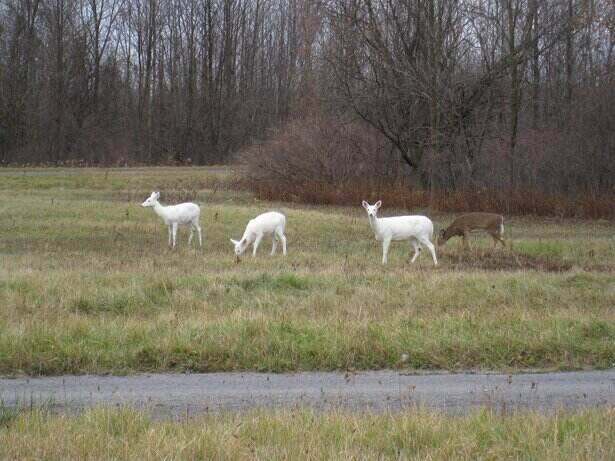 |
| Image credit: BrianAdler / Wikimedia Commons |
Population size: 300
Threat: -
Status on IUCN red list: Not endangered
Habitat: Former Seneca Army Depot, Seneca County, New York, USA.
Life expectancy: 10 years or below
Seneca White Deer is a beautiful deer on the list of the rarest animals in the world in 2025. White deer are very rare, they are white-tailed deer (Odocoileus virginianus) natural variation. They are not endangered because they are white as a result of genetic variation.
They are deer with recessive genes caused by a condition that refers to a leucism (lack of pigmentation). They are not albino which is a lack of production of melanin; leucism is actually a lack of cells that produce pigment. The condition continues to manifest in the small population of Seneca Deer.
Because this animal is beautiful and rare, they are a lot of myths attached to them. In the past hunters do kill white deer, but now no threat as they are protected in about 7,000 acres of Seneca Army Depot.
If you will like to see this rare beautiful white deer, you travel to the Seneca Army Depot in which you will have the opportunity of 90 minutes bus tour there.
See also:
14. Hirola
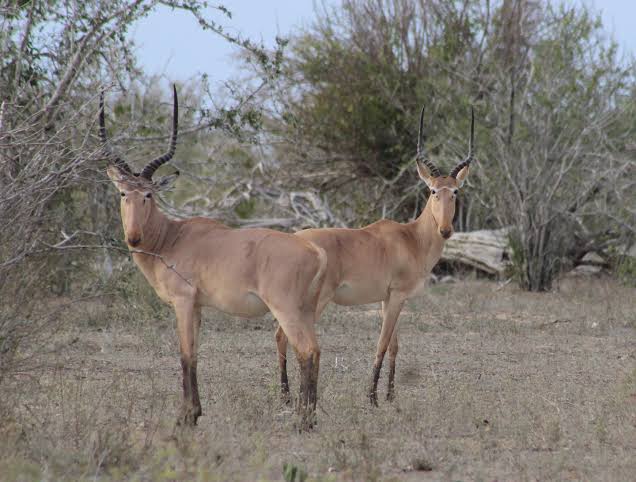 |
| Image credit: Appliedecologistsblog.com |
Population size: about 400
Threat: Habitat loss and poaching
Status on IUCN red list: Critically endangered
Habitat: Hirola Basin, Kenya
Life expectancy: About 10 years
They are big antelope that can weigh from 80 to 120 kg and they can be as tall as 1.25 meters. This antelope has been on the IUCN Red List as of 1988, and it is expected to go extinct in less than ten years unless something is done to conserve them.
They are still certainly one of the rarest animals in 2025. They are formerly found in Somalia, but it seems there is no population of the animals in the place anymore. Due to hunting and habitat destruction, their numbers have dropped.
Since their natural predators like jackals, cheetahs, and lions have been killed out by those hunting Hirolas for meat or trophies, the Hirolas survive in barren scrublands with little food. They are killed for their horns and meat and the locals believe things from these animals are medicinal.
The expansions of urban areas lead to deforestation as negative impacts on them. They are monogamous in nature, that is they have one partner for a lifetime.
If at the Hirola Basin of Kenya, these animals should extinct, it will have negative effects as they are an important part of the ecosystem there.
15. The Hooded Grebe
 |
| Image credit: Juan María Raggio |
Population size: around 700
Threat: Climate change (resulting in less breeding and rapid declines in a key food source)
Status on IUCN red list: Critically endangered
Habitat: Patagonian province of Santa Cruz, Argentina, and Magallanes, Chile.
Life expectancy: 5 years
It is an aquatic diving and flying bird that is among the Podicipediformes family. They are part of the rarest animals in the world. They were accidentally discovered by Maurice Rumboll, an Argentine ornithologist in 1974. Their size is about 320 mm (12.5 in) long. They can weigh between 0.42 to 0.61 kg (0.92 to 1.34 Ib).
They are birds with white and black color patterns and red-colored eyes. The grebes' dance happens between the two sexes to attract mates, referred to as the hooded grebe courtship ritual.
Due to climatic change, there is dryness of high elevation lakes in Argentinian summer, the place they breed. And during the winter, the place is less snow. In addition, the Milfoil plant (Myriophillum sp.) is this bird's favorite food, due to climate change, the plant is fading away.
Their reproduction is very low, the female only hatches one chick per breeding season. The Kelp Gulls and the American mink have the potential of destroying these animals because they are small in number. These are other rarest birds that are lesser in population than this bird, you can check them here.
What is your own view about the rarest animals in the world in 2025? Let's hear from you in the comment section below (Post a comment). Please share this article and subscribe to our mailing list. You can also follow us on our social media handles. Thanks for your time!
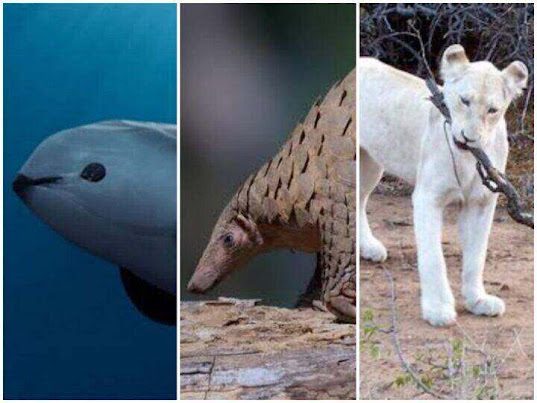
Post a Comment